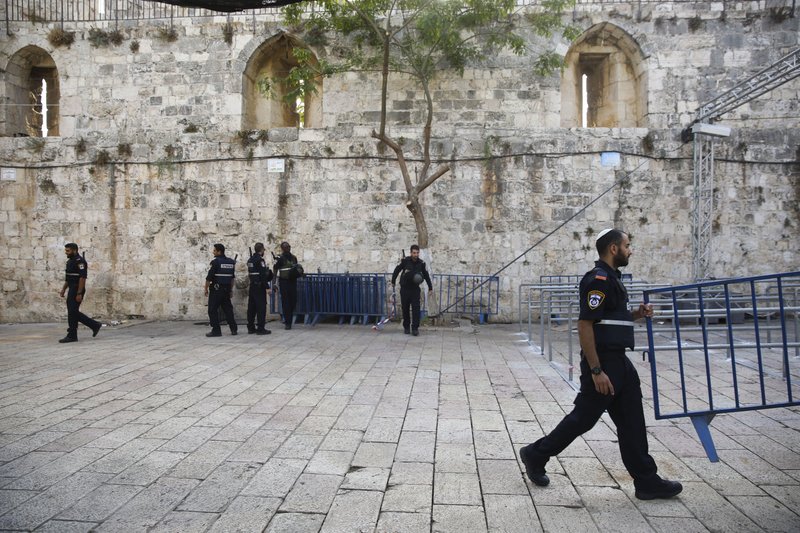JERUSALEM - Thousands of Palestinian Muslims prayed in the streets near Jerusalem's most contested holy site Tuesday, heeding a call by clergy to not enter the shrine even after Israel removed the metal detectors it installed there a week earlier.
Muslim leaders said they would call off the protests only after they make sure Israel had restored the situation to what it was before the latest crisis.
Some Muslim officials claimed that Israel had used the absence of Muslim clerics from the walled compound in the past week of protests to install new security cameras.
The continued standoff underscored the deep distrust between Israel and the Palestinians when it comes to the shrine -- the third-holiest in Islam and the most sacred in Judaism.
The 37-acre esplanade, known to Muslims as the Noble Sanctuary and to Jews as the Temple Mount, has been a lightning rod for rival narratives of the two sides. It has triggered major confrontations in the past.
Israel seemed eager to put the crisis behind it and restore calm after a week of prayer protests, street clashes and several incidents of deadly violence.
But Prime Minister Benjamin Netanyahu and his government also faced a growing backlash for what critics said was hasty decision-making and embarrassing policy zigzags.
In a compromise, Israel's security Cabinet announced that in place of the metal detectors, it would employ nonintrusive "advanced technologies," which reportedly include smart cameras that can detect hidden objects. The new security system is to be set up in the next six months at a cost of $28 million.
Meanwhile, Palestinian politicians and Muslim clerics demanded that Israel restore the situation at the shrine in Jerusalem's Old City to what it was before July 14. On that day, three Arab gunmen opened fire from the shrine at Israeli police guards, killing two people before being shot dead.
In response, Israel closed the shrine for two days for weapons searches and installed the metal detectors. The decision triggered Muslim protests over allegations that Israel was trying to expand its control at the site under the guise of security -- a claim Israel has denied.
On Tuesday, hours after Israel removed the metal detectors, Muslim leaders said a technical committee would check the area in and around the compound carefully to see if Israel had made any unilateral changes during the time the shrine stood empty.
Protests will continue until the check is completed, they said.
By Tuesday evening, thousands of worshippers prayed at the Old City's Lion's Gate, one of the main flash points in recent days. They knelt on prayer rugs arranged in rows on the asphalt as Israeli riot police lined up nearby.
After the prayers, many in the crowd chanted, "Oh God, oh God, oh God," as they raised their right index fingers to the sky in a sign of religious fervor.
Khalil Abu Arafeh, a 67-year-old retiree, said he and the others would follow the lead of the Muslim clergy.
"We will not go. We will keep praying here," he said, alleging that Israel hadn't removed all of the new security measures.
The Israeli daily Haaretz said the security Cabinet had decided to remove the metal detectors but leave in place the newly installed cameras.
Palestinian President Mahmoud Abbas said security coordination between his forces and Israeli troops in the West Bank would remain on hold until Israel has restored the situation at the shrine to what it was before July 14.
He had announced last week that he was freezing all ties with Israel until the metal detectors were taken down.
The White House said Tuesday evening that Israel had removed recently installed magnetometers and cameras "despite the demonstrated need to enhance security" at the site.
"The United States applauds the efforts of Israel to maintain security while reducing tensions in the region," the White House's statement said.
Over the past two days, the crisis over the shrine has been closely linked to a deadly shooting at the Israeli Embassy in Jordan.
The Sunday shooting, in which an Israeli guard killed two Jordanians after one attacked him with a screwdriver, briefly led to a diplomatic standoff.
Jordan initially said the guard could leave only after an investigation, but eventually let him go. Embassy staff members, including the guard, returned to Israel late Monday, after a phone call between Netanyahu and Jordan's King Abdullah II.
Jordan also serves as Muslim custodian of the Jerusalem shrine, and the sequence of events -- the return of the embassy staff followed by the removal of the metal detectors -- fueled rumors that a broader deal had been struck.
Jordanian Foreign Minister Ayman Safadi denied this, saying, "There's no bargain here."
One of the Jordanians, the 16-year-old who had attacked the Israeli with a screwdriver, was buried Tuesday in Amman.
Information for this article was contributed by Karin Laub of The Associated Press.
